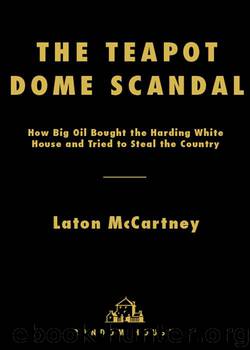The Teapot Dome Scandal: How Big Oil Bought the Harding White House and Tried to Steal the Country by Laton McCartney

Author:Laton McCartney [McCartney, Laton]
Language: eng
Format: epub
ISBN: 9781588367662
Publisher: Random House Publishing Group
Published: 2008-03-25T04:00:00+00:00
30
OPENING ROUNDS
On Monday, October 23, 1923, at 10:00 a.m., the Teapot Dome investigation by the Senate Committee on Public Lands and Surveys finally got under way in room 210 of the Senate Office Building. It had been scheduled to begin October 15, but with many committee members not yet back in Washington, the hearings were delayed. Reed Smoot, a Mormon apostle and conservative Republican senator from Utah, called the committee to order. Present were Thomas Walsh of Montana (D); George William Norris of Nebraska (R); Irvine Lenroot of Wisconsin (R); John Kendrick of Wyoming (D); Edwin Ladd of North Dakota (R); Peter Norbeck of South Dakota (R); and the committee chairman, Reed Smoot.
It had been eighteen months since “Fighting Bob” La Follette had called for a full-scale investigation into the oil leases in a scathing speech before the Senate and then vice president Coolidge. La Follette had charged that under Fall, the Department of the Interior was the “sluiceway for 90 percent of the corruption in government.” The resolution had passed unanimously on April 29, 1922.
In the interim, President Harding had died, Albert Fall had resigned, and the initial controversy surrounding the naval reserves had largely petered out. The ranking Republicans on the committee—Smoot, its chair, and Irvine Lenroot of Wisconsin—were eager to lay Teapot to rest as expeditiously as possible—and not simply because the investigation could give the party a black eye or damage its chances in the upcoming election year. At the time the hearings got under way, the RNC, notably its former chairman, Will Hays, was counting on Harry Sinclair to pay off more than $1 million in debts that remained from the 1920 campaign. Meanwhile, the hearings commenced at a time when potentially billions of dollars’ worth of Russian, Persian, Mexican, and Wyoming oil was in Sinclair’s grasp. If Sinclair was found to have broken any laws during the course of the investigation, his hopes of establishing a global petroleum empire could well be dashed. Which would mean the RNC would lose its most generous sugar daddy.
Well before the hearings got under way, Sinclair and some of his associates had taken measures to protect themselves, pressuring Senator Smoot to derail the inquiry almost as soon as La Follette’s resolution cleared the Senate. In May 1922, M. D. McEniry, the Interior Department’s man in Denver, had written Fall regarding a conversation he’d had with Leo Stack, who at the time had just enlisted the Denver Post’s owners in an effort to collect $1 million from Harry Sinclair. Stack had told him that John C. Howard, president of the Utah Oil Refining Company and a leading member of the Mormon Church, was now in Washington and had been there for a week or more.
Utah Oil Refining was a subsidiary of Midwest Refining, which Harry Blackmer had recently sold to Robert Stewart of Standard Oil of Indiana, Harry Sinclair’s partner in the Wyoming oil ventures. It was Midwest that sent Howard to Washington, “to help them out with Senator Smoot,” Stack said.
Download
This site does not store any files on its server. We only index and link to content provided by other sites. Please contact the content providers to delete copyright contents if any and email us, we'll remove relevant links or contents immediately.
Rich Dad Poor Dad by Robert T. Kiyosaki(6632)
Bad Blood by John Carreyrou(6621)
Principles: Life and Work by Ray Dalio(6447)
Playing to Win_ How Strategy Really Works by A.G. Lafley & Roger L. Martin(6305)
Management Strategies for the Cloud Revolution: How Cloud Computing Is Transforming Business and Why You Can't Afford to Be Left Behind by Charles Babcock(4573)
The Confidence Code by Katty Kay(4260)
Thinking in Bets by Annie Duke(4227)
American Kingpin by Nick Bilton(3886)
Delivering Happiness by Tony Hsieh(3425)
Project Animal Farm: An Accidental Journey into the Secret World of Farming and the Truth About Our Food by Sonia Faruqi(3221)
The Power of Habit by Charles Duhigg(3139)
The Tyranny of Metrics by Jerry Z. Muller(3072)
The Marketing Plan Handbook: Develop Big-Picture Marketing Plans for Pennies on the Dollar by Robert W. Bly(3062)
Brotopia by Emily Chang(3054)
Mastering Bitcoin: Programming the Open Blockchain by Andreas M. Antonopoulos(3045)
I Live in the Future & Here's How It Works by Nick Bilton(2997)
The Content Trap by Bharat Anand(2926)
Building a StoryBrand by Donald Miller(2915)
Applied Empathy by Michael Ventura(2904)
